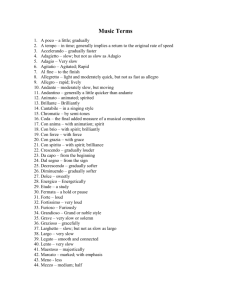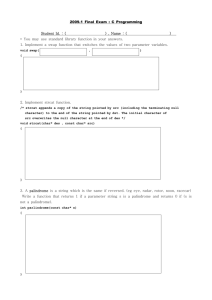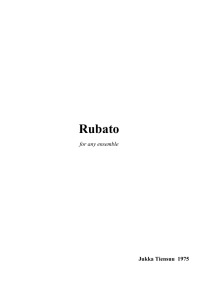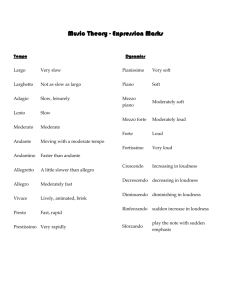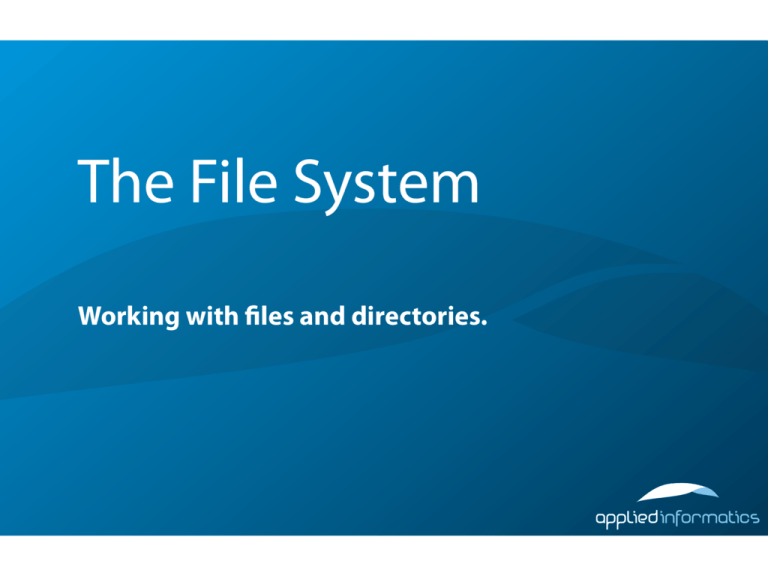
The File System
Working with files and directories.
Overview
>
>
>
>
>
Working with paths
Basic file operations
Working with directories
Finding files with glob patterns
Temporary files
Paths
>
>
>
>
Different operating systems use different notations to specify the
location of a file or directory (in other words, a path).
This makes it hard to work with files and directories in a portable
way.
POCO provides a class that abstracts the differences in the
various notations, by focusing on common concepts.
POCO supports the path notations used by:
>
>
>
Windows
Unix
OpenVMS
Paths in POCO
>
A path in POCO consists of:
>
an optional node name:
on Windows, this is the computer name in an UNC path;
on OpenVMS, this is the node name of a system in a cluster;
on Unix, this is unused.
>
>
>
an optional device name:
on Windows, this is a drive letter;
on OpenVMS, this is the name of a storage device;
on Unix, this is unused.
a list of directory names
a file name (including extension) and version (OpenVMS only)
Paths in POCO (cont'd)
>
POCO supports two kinds of paths:
>
>
>
absolute path
describes the path to a resource, starting at a filesystem root.
relative path
describes the path to a resource, starting at a certain directory
(usually, the user's current directory).
A relative path can be transformed into an absolute one (but
not vice versa).
Also, a path can point to a directory, or to a file.
For a file pointing to a directory, the file name part is empty.
Path Examples
Path:
C:\Windows\system32\cmd.exe
Style:
Windows
Kind:
absolute, to file
Node Name:
–
Device Name:
C
Directory List:
Windows, system32
File Name:
cmd.exe
File Version:
–
Path Examples (cont'd)
Path:
Poco\Foundation\
Style:
Windows
Kind:
relative, to directory
Node Name:
–
Device Name:
–
Directory List:
Poco, Foundation
File Name:
–
File Version:
–
Path Examples (cont'd)
Path:
\\www\site\index.html
Style:
Windows
Kind:
absolute, to file
Node Name:
www
Device Name:
–
Directory List:
site
File Name:
index.html
File Version:
–
Path Examples (cont'd)
Path:
/usr/local/include/Poco/Foundation.h
Style:
Unix
Kind:
absolute, to file
Node Name:
–
Device Name:
–
Directory List:
usr, local, include, Poco
File Name:
index.html
File Version:
–
Path Examples (cont'd)
Path:
../bin/
Style:
Unix
Kind:
relative, to directory
Node Name:
–
Device Name:
–
Directory List:
.., bin
File Name:
–
File Version:
–
Path Examples (cont'd)
Path:
VMS001::DSK001:[POCO.INCLUDE.POCO]POCO.H;2
Style:
OpenVMS
Kind:
absolute, to file
Node Name:
VMS001
Device Name:
DSK001
Directory List:
POCO, INCLUDE, POCO
File Name:
POCO.H
File Version:
2
The Path Class
>
>
>
>
Poco::Path represents a path in POCO.
#include "Poco/Path.h"
Poco::Path does not care whether the path it contains actually
exists in the file system (this is what Poco::File is for, which will be
discussed shortly).
Poco::Path supports value semantics (copy construct and
assignment); relational operators are not available.
Building a Path
>
There are two ways to build a path:
>
>
build one from scratch, piece by piece
build one by parsing a string containing a path;
you have to specify the style of the path:
>
>
>
>
>
PATH_UNIX
PATH_WINDOWS
PATH_VMS
PATH_NATIVE (the native syntax of the current system)
PATH_GUESS (let POCO figure out the syntax)
Building a Path From Scratch
1. Create an empty path, using the default constructor (relative
path), or the constructor taking a boolean argument (true =
absolute, false = relative).
2. Use the following mutators to set node and device, if required:
void setNode(const std::string& node)
void setDevice(const std::string& device)
3. Add directory names:
void pushDirectory(const std::string& name)
4. Set the file name:
void setFileName(const std::string& name)
#include "Poco/Path.h"
int main(int argc, char** argv)
{
Poco::Path p(true); // path will be absolute
p.setNode("VMS001");
p.setDevice("DSK001");
p.pushDirectory("POCO");
p.pushDirectory("INCLUDE");
p.pushDirectory("POCO");
p.setFileName("POCO.H");
std::string s(p.toString(Poco::Path::PATH_VMS));
// "VMS001::DSK001:[POCO.INCLUDE.POCO]POCO.H"
p.clear(); // start over with a clean state
p.pushDirectory("projects");
p.pushDirectory("poco");
s = p.toString(Poco::Path::PATH_WINDOWS); // "projects\poco\"
s = p.toString(Poco::Path::PATH_UNIX);
// "projects/poco/"
s = p.toString(); // depends on your platform
}
return 0;
Parsing a Path From a String
>
>
A path can be constructed from a string (std::string or old-style C
string) containing a path in any supported format:
Path(const std::string& path)
Path(const std::string& path, Style style)
if no style is given, the path is expected to be in native format.
A path can also be constructed from another path (pointing to a
directory) and a file name, or from two paths (the first one
absolute, the second one relative):
Path(const Path& parent, const std::string& fileName)
Path(const Path& parent, const Path& relative)
Parsing a Path From a String (cont'd)
>
>
A path can also be created by assigning a string, using the
assignment operator, or the assign() or parse() methods:
Path& assign(const std::string& path)
Path& parse(const std::string& path)
Path& assign(const std::string& path, Style style)
Path& parse(const std::string& path, Style style)
If a path is not valid, a Poco::PathSyntaxException is thrown. To
test whether a path's syntax is valid, tryParse() can be used:
bool tryParse(const std::string& path)
bool tryParse(const std::string& path, Style style)
#include "Poco/Path.h"
using Poco::Path;
int main(int argc, char** argv)
{
//creating a path will work independent of the OS
Path p("C:\\Windows\\system32\\cmd.exe");
Path p("/bin/sh");
p = "projects\\poco";
p = "projects/poco";
p.parse("/usr/include/stdio.h", Path::PATH_UNIX);
bool
ok =
ok =
ok =
}
ok = p.tryParse("/usr/*/stdio.h");
p.tryParse("/usr/include/stdio.h", Path::PATH_UNIX);
p.tryParse("/usr/include/stdio.h", Path::PATH_WINDOWS);
p.tryParse("DSK$PROJ:[POCO]BUILD.COM", Path::PATH_GUESS);
return 0;
Working With Paths
>
>
>
A Poco::Path can be converted to a string:
std::string toString()
std::string toString(Style style)
It is possible to access the different parts of a path:
const std::string& getNode()
const std::string& getDevice()
const std::string& directory(int n) (also operator [])
const std::string& getFileName()
To get the number of directories in a path:
int depth() const
Working With Paths (cont'd)
>
The two parts of a file name, base name and extension, can be
accessed, too:
>
>
>
std::string getBaseName() const
void setBaseName(const std::string& baseName)
std::string getExtension() const
void setExtension(const std::string& extension)
The base name ends before (and the extension starts after) the
last period in the file name.
#include "Poco/Path.h"
using Poco::Path;
int main(int argc, char** argv)
{
Path p("c:\\projects\\poco\\build_vs80.cmd", Path::PATH_WINDOWS);
std::string device(p.getDevice());
int n = p.depth();
std::string dir1(p.directory(0));
std::string dir2(p[1]);
std::string fileName(p[2]);
fileName = p.getFileName();
std::string baseName(p.getBaseName());
std::string extension(p.getExtension());
p.setBaseName("build_vs71");
fileName = p.getFileName();
}
return 0;
//
//
//
//
//
"c"
2
"projects"
"poco"
"build_vs80.cmd"
// "build_vs80"
// "cmd"
// "build_vs71.cmd"
Path Operations
>
>
>
Path& makeDirectory()
makes the file name (if there is one) the last directory name
Path& makeFile()
makes the last directory name the file name, if there is none
Path& makeParent()
Path parent() const
makes the path refer to its parent (clears the file name, if there is
one, otherwise removes the last directory)
Path Operations (cont'd)
>
>
>
Path& makeAbsolute()
Path& makeAbsolute(const Path& base)
Path absolute() const
Path absolute(const Path& base)
turns a relative path into an absolute one
Path& append(const Path& path)
appends another path
Path& resolve(const Path& path)
if path is absolute, it replaces the current one; otherwise it is
appended
Path Properties
>
>
>
>
bool isAbsolute() const
returns true if the path is absolute, false otherwise
bool isRelative() const
return true if the path is relative, false otherwise
bool isDirectory() const
returns true if the path does not have a file name
bool isFile() const
returns true if the path has a file name
#include "Poco/Path.h"
using Poco::Path;
int main(int argc, char** argv)
{
Path p("/usr/include/stdio.h", Path::PATH_UNIX);
Path parent(p.parent());
std::string s(parent.toString(Path::PATH_UNIX)); // "/usr/include/"
Path p1("stdlib.h");
Path p2("/opt/Poco/include/Poco.h", Path::PATH_UNIX);
p.resolve(p1);
s = p.toString(Path::PATH_UNIX); // "/usr/include/stdlib.h"
p.resolve(p2);
s = p.toString(Path::PATH_UNIX); // "/opt/Poco/include/Poco.h"
}
return 0;
Special Directories And Files
>
Poco::Path provides static methods to obtain the paths to system
specific special directories or files:
>
>
>
>
std::string current()
returns the path for the current working directory
std::string home()
returns the path to the user's home directory
std::string temp()
returns the path to the system's directory for temporary files
std::string null()
returns the path to the system's null file/device
(e.g., "/dev/null" or "NUL:")
#include "Poco/Path.h"
#include <iostream>
using Poco::Path;
int main(int argc,
{
std::cout
<< "cwd:
<< "home:
<< "temp:
<< "null:
}
return 0;
char** argv)
"
"
"
"
<<
<<
<<
<<
Path::current()
Path::home() <<
Path::temp() <<
Path::null() <<
<< std::endl
std::endl
std::endl
std::endl;
Paths And Environment Variables
>
>
Paths found in configuration files often contain environment
variables. Environment variables in a path must be expanded
before such a path can be passed to Poco::Path.
std::string expand(const std::string& path)
returns a copy of path with all environment variables expanded.
The syntax of environment variables is system specific (e.g., $VAR
on Unix, %VAR% on Windows).
On Unix, also expands "~/" to the current user's home directory.
#include "Poco/Path.h"
using Poco::Path;
int main(int argc, char** argv)
{
std::string config("%HOMEDRIVE%%HOMEPATH%\\config.ini");
// std::string config("$HOME/config.ini");
std::string expConfig(Path::expand(config));
}
return 0;
Filesystem Roots
>
void listRoots(std::vector<std::string>& roots)
fills the given vector of strings with the names of all mounted
root filesystems. On Windows, the list will consist of the available
drive letters. On OpenVMS, the list will contain the names of all
mounted disks. On Unix, the list will consist of exactly one slash
("/").
Finding Files
>
>
bool find(const std::string& pathList,
const std::string& name, Path& path)
searches the file with the given name in the locations specified in
pathList. The paths in pathList must be delimited by the
platform's path separator (";" on Windows, ":" on Unix). A relative
path may be given in name.
If the file is found in one of the locations given in pathList, the
absolute path of the file is stored in path, and true is returned.
Otherwise, false is returned and path remains unchanged.
There is a variant of this function taking iterators to a string
vector instead of a path list.
#include "Poco/Path.h"
#include "Poco/Environment.h"
using Poco::Path;
using Poco::Environment;
int main(int argc, char** argv)
{
std::string shellName("cmd.exe"); // Windows
// std::string shellName("sh");
// Unix
std::string path(Environment::get("PATH"));
Path shellPath;
bool found = Path::find(path, shellName, shellPath);
std::string s(shellPath.toString());
}
return 0;
Working With Files
>
>
>
>
POCO has support for working with a file's metadata only. To
access the actual data in a file, use the file streams provided by
the standard library.
With POCO, you can find out whether a file or directory exists, is
readable or writable, when it was created or modified or how big
it is.
You can also change some of a file's attributes, rename a file,
copy a file, or delete a file.
Finally, you can create empty files (in an atomic operation), and
directories.
The File Class
>
>
>
>
All file-related operations are available in Poco::File.
#include "Poco/File.h"
To create a Poco::File, you need to supply a path. This path can be
in a Poco::Path, or in a string (std::string or C style). You can also
create an "empty" file, and set the path at a later time, with an
assignment.
Poco::File supports full value semantics, including all relational
operators (==, !=, <, <=, >, >=). The relational operators are
implemented as plain string comparisons using the file's path.
Querying File Attributes
>
>
>
>
bool exists() const
returns true if the file exists, false otherwise
bool canRead() const
returns true if the file is readable (the user has sufficient
privileges to read from the file), false otherwise
bool canWrite() const
returns true if the file is writeable (the user has sufficient
privileges to write to the file), false otherwise
bool canExecute() const
returns true if the file is executable, false otherwise
Querying File Attributes (cont'd)
>
>
>
>
bool isFile() const
returns true if the file is a regular file (and not a directory, or
symbolic link), false otherwise
bool isLink() const
returns true if the file is a symbolic link, false otherwise
bool isDirectory() const
returns true if the file is a directory, false otherwise
bool isDevice() const
returns true if the file is a device, false otherwise
Querying File Attributes (cont'd)
>
>
>
>
bool isHidden() const
returns true if the file has the hidden attribute set (on Windows),
or its name starts with a dot (Unix)
Poco::Timestamp created() const
returns the date and time the file was created
Poco::Timestamp getLastModified() const
returns the date and time the file was accessed
File::FileSize getSize() const
returns the size of the file in bytes. On most systems, File::FileSize
is an unsigned 64-bit integer.
Modifying File Attributes
>
>
>
>
void setLastModified(Poco::Timestamp dateTime)
sets the access timestamp of the file
void setSize(FileSize newSize)
sets the size of the file in bytes, e.g. to truncate a file
void setWritable(bool flag = true)
Makes the file writeable (if flag == true), or read-only
(if flag == false), by setting the appropriate flags in the filesystem
void setReadOnly(bool flag)
same as setWritable(!flag)
Rename, Copy, Delete
>
>
>
>
void copyTo(const std::string& path) const
copies the file to the given path (which can be a directory)
void moveTo(const std::string& path) const
copies the file to the given path (which can be a directory) and
then deletes the original file
void renameTo(const std::string& path)
renames the file
void remove(bool recursive = false)
deletes the file. If the file is a directory and recursive == true,
recursively deletes all files and subdirectories in the directory.
Creating Files and Directories
>
>
>
bool createFile()
creates a new, empty file in an atomic operation. Returns true if
the file has been created, or false if the file already exists. Throws
a Poco::FileException if creation fails.
bool createDirectory()
creates a new directory. Returns true if the directory has been
created, or false if the directory already exists. Throws a
Poco::FileException if creation fails (e.g., if the parent directory
does not exist).
void createDirectories()
creates a directory, as well as all parent directories, if necessary
Reading a Directory
>
void list(std::vector<std::string>& files) const
void list(std::vector<File>& files) const
fills the given vector with the names of all files in the directory.
Internally, this uses a Poco::DirectoryIterator, which will be
discussed shortly.
#include "Poco/File.h"
#include "Poco/Path.h"
#include <iostream>
using Poco::File;
using Poco::Path;
int main(int argc, char** argv)
{
std::string tmpPath(Path::temp());
tmpPath.pushDirectory("PocoFileSample");
File tmpDir(tmpPath);
tmpDir.createDirectories();
bool
bool
bool
bool
bool
exists
isFile
isDir
canRead
canWrite
=
=
=
=
=
tmpDir.exists();
tmpDir.isFile();
tmpDir.isDirectory();
tmpDir.canRead();
tmpDir.canWrite();
File tmpFile(Path(tmpPath, std::string("PocoFileSample.dat")));
if (tmpFile.createFile())
{
tmpFile.setSize(10000);
File tmpFile2(Path(tmpPath, std::string("PocoFileSample2.dat")));
tmpFile.copyTo(tmpFile2.path());
Poco::Timestamp now;
tmpFile.setLastModified(now);
}
tmpFile.setReadOnly();
canWrite = tmpFile.canWrite();
tmpFile.setWriteable();
canWrite = tmpFile.canWrite();
std::vector<std::string> files;
tmpDir.list(files);
std::vector<std::string>::iterator it = files.begin();
for (; it != files.end(); ++it)
{
std::cout << *it << std::endl;
}
tmpDir.remove(true);
}
return 0;
The DirectoryIterator Class
>
>
>
Poco::DirectoryIterator provides an iterator-style interface for
reading the contents of a directory.
#include "Poco/DirectoryIterator.h"
Poco::DirectoryIterator has some limitations:
>
>
>
only forward iteration (++) is supported
an iterator copied from another one will always point to the
same file as the original iterator, even if the original iterator
has been advanced (all copies share the same state)
Poco::DirectoryIterator maintains a Poco::File and an absolute
Poco::Path for the current item.
#include "Poco/DirectoryIterator.h"
#include <iostream>
using Poco::DirectoryIterator;
using Poco::Path;
int main(int argc, char** argv)
{
std::string cwd(Path::current());
DirectoryIterator it(cwd);
DirectoryIterator end;
while (it != end)
{
std::cout << it.name();
if (it->isFile())
std::cout << it->getSize();
std::cout << std::endl;
Path p(it.path());
++it;
}
}
return 0;
The Glob Class
>
>
>
Poco::Glob implements glob-style pattern matching as known
from Unix shells.
#include "Poco/Glob.h"
In a pattern, '*' matches any sequence of characters, '?' matches
any single character, [SET] matches any single character in the
specified set, and [!SET] matches any single character not in the
specified set.
A set is composed of characters or ranges, e.g. [123] matches a
digit 1, 2 or 3; [a-zA-Z] matches any lower- or uppercase letter.
Special characters can be escaped with a backslash.
The Glob Class (cont'd)
>
>
>
A Poco::Glob is constructed with a pattern, and an optional
option flag. The GLOB_DOT_SPECIAL option can be set to hide
files starting with a period, in old Unix tradition.
bool match(const std::string& subject)
returns true if the path in subject matches the Glob's pattern,
false otherwise.
void glob(const std::string& pattern,
std::set<std::string>& files, int options = 0)
void glob(const Path& pattern,
std::set<std::string>& files, int options = 0)
fills the set with all files matching the given pattern.
#include "Poco/Glob.h"
#include <iostream>
using Poco::Glob;
int main(int argc, char** argv)
{
std::set<std::string> files;
Glob::glob("%WINDIR%\\system32\\*.exe", files);
// Glob::glob("/usr/include/*/*.h", files);
std::set<std::string>::iterator it = files.begin();
for (; it != files.end(); ++it)
{
std::cout << *it << std::endl;
}
}
return 0;
Temporary Files
>
Many programs need temporary files, which can be characterized
as follows:
>
>
>
>
>
a temporary file is created in a special system-specific
directory (e.g., "/tmp/" on Unix systems)
a temporary file has an automatically generated unique name
a temporary file must be deleted when it is no longer needed
Poco::TemporaryFile helps in doing all these things.
#include "Poco/TemporaryFile.h"
The TemporaryFile Class
>
>
>
>
>
Poco::TemporaryFile is derived from Poco::File.
The constructor automatically creates a unique file name, placed
in the system-specific directory for temporary files. The file itself
is not created.
The destructor deletes the file, if it has been created.
Alternatively, deletion can be postponed until the program
terminates, or disabled altogether.
Arbitrary files can be registered for deletion upon termination of
the program.
TemporaryFile Functions
>
>
>
>
void keep()
disables automatic deletion of the file by the destructor
void keepUntilExit()
disables automatic deletion of the file by the destructor, and
registers the file for deletion upon termination of the program
static void registerForDeletion(const std::string& path)
registers a file for automatic deletion upon termination of the
program
static std::string tempName()
creates a unique path name for a temporary file
#include "Poco/TemporaryFile.h"
#include <fstream>
using Poco::TemporaryFile;
int main(int argc, char** argv)
{
TemporaryFile tmp;
std::ofstream ostr(tmp.path().c_str());
ostr << "Hello, world!" << std::endl;
ostr.close();
}
return 0;
Copyright © 2006-2010 by Applied Informatics Software Engineering GmbH.
Some rights reserved.
www.appinf.com | info@appinf.com
T +43 4253 32596 | F +43 4253 32096


